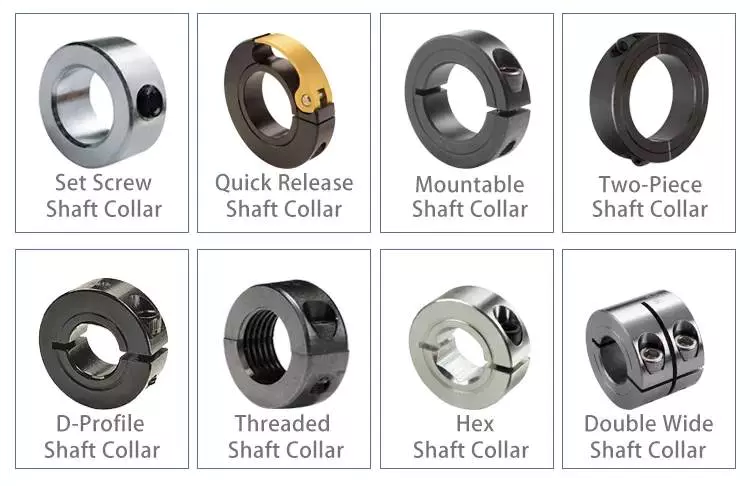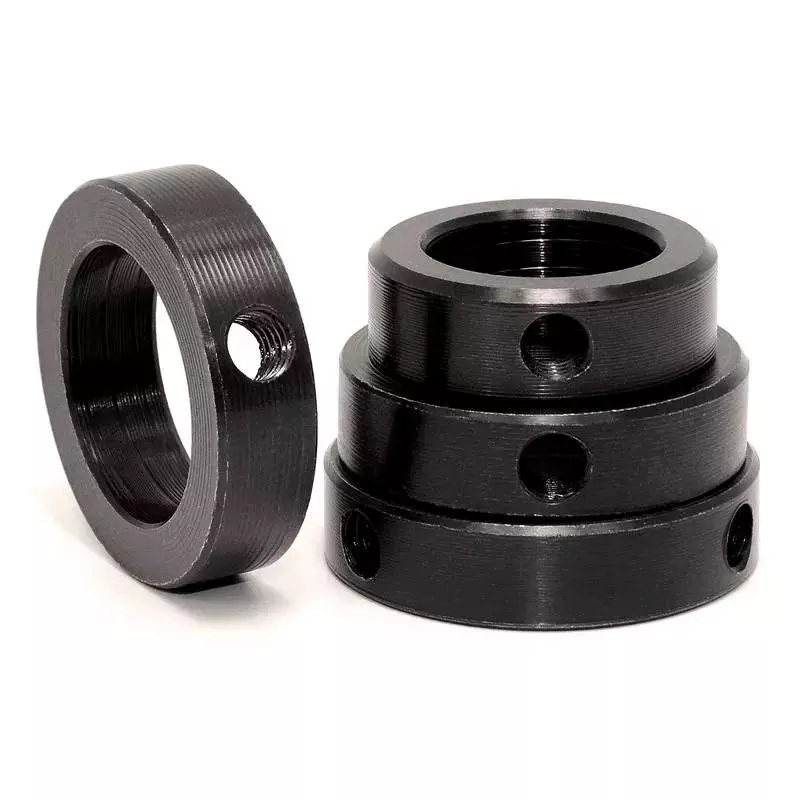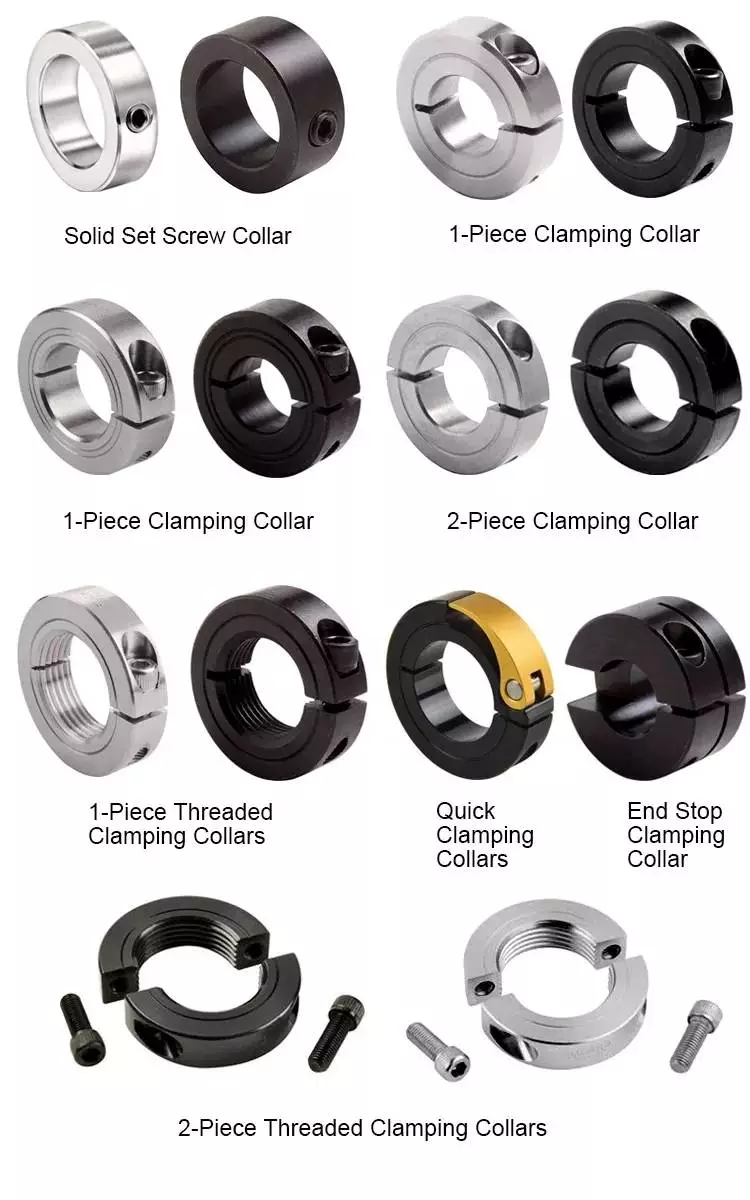Product Description
Product Description
Simply slide these shaft collars CZPT a shaft and tighten the screw to hold the shaft collar in place. Shaft collars are easy to adjust with their screws.
| Size | 1/8″ to 6″ and 3mm to 150mm. or non-standard according to your requirements. |
| Material | Mild Steel C20 C45 ,Stainless Steel SS304 316 , Aluminum |
| Process | CNC Turning, Forging |
| Size | 1/8”-1” OR Custom Sizes |
| Surface Treatment | Zinc Plated, Anodized, Black Oxide, etc. |
| Type | solid shaft collar |
| single split shaft collar | |
| doubel split shaft collar | |
| eccentric collar | |
| threaded shaft collar ( single split ) | |
| dimensions of S type split collar |
Detailed Photos
Catalogue
1) METRIC CZPT SHAFT COLLAR
2) INCH CZPT SHAFT COLLAR
3) METRIC SET SPLIT COLLARS
4) INCH SET SPLIT COLLARS
Packaging & Shipping
carton boxes+ export wooden box
FAQ
Q1: Are you trading company or manufacturer ?
A: We are factory.
Q2: How long is your delivery time and shipment?
1.Sample Lead-times: 10-20 days.
2.Production Lead-times: 30-45 days after order confirmed.
Q3: What is your advantages?
1. The most competitive price and good quality.
2. Perfect technical engineers give you the best support.
3. OEM is available.
/* January 22, 2571 19:08:37 */!function(){function s(e,r){var a,o={};try{e&&e.split(“,”).forEach(function(e,t){e&&(a=e.match(/(.*?):(.*)$/))&&1
| Standard Or Nonstandard: | Standard |
|---|---|
| Bore Diameter: | 4-50mm |
| Structure: | Flexible |
| Material: | Carbon Steel C20 C45 |
| Type: | Shaft Collar |
| Surface Treatment: | Zinc Plated or Black Oxide as Required |
| Customization: |
Available
| Customized Request |
|---|

Can I find information on alternatives to traditional shaft collars for specific applications?
Yes, information on alternatives to traditional shaft collars for specific applications is available. In addition to traditional shaft collars, there are various innovative solutions and alternative devices that can be used depending on the specific application requirements. Here are some sources where you can find information on alternatives to traditional shaft collars:
- Manufacturer Websites and Catalogs: Many manufacturers of mechanical components provide detailed information on their websites or in product catalogs about alternative devices or solutions to traditional shaft collars. These resources often highlight specific applications, industries, or challenges where alternative devices may be more suitable. Exploring manufacturer websites and requesting catalogs can help you discover innovative options.
- Technical Publications and Journals: Technical publications and journals focused on mechanical engineering, automation, or industrial applications often feature articles or case studies discussing alternative devices for various applications. These resources provide insights into the latest advancements and emerging technologies in the field. Accessing academic databases, engineering libraries, or subscribing to relevant publications can help you access this information.
- Engineering Conferences and Seminars: Attending engineering conferences, seminars, or workshops related to mechanical components or industrial automation can provide opportunities to learn about alternative devices through presentations, panel discussions, or technical sessions. These events often bring together experts, researchers, and industry professionals who share their knowledge and present innovative solutions. Checking event calendars, industry association websites, or engineering organizations can help you find relevant conferences or seminars.
- Online Engineering Forums and Communities: Online engineering forums, communities, and social media groups dedicated to mechanical engineering or industrial automation can be valuable sources of information on alternative devices. These platforms allow engineers and professionals to exchange ideas, discuss challenges, and share their experiences with different solutions. Participating in these forums, asking questions, or searching for relevant discussions can provide insights into alternative devices for specific applications.
- Consulting with Industry Experts: Seeking advice from industry experts, such as mechanical engineers, industrial automation specialists, or application consultants, can help you explore alternative devices tailored to your specific application requirements. These professionals have in-depth knowledge of the field and can provide personalized recommendations based on your needs. They can be contacted through engineering consulting firms, professional networks, or by reaching out to manufacturers directly.
When considering alternatives to traditional shaft collars, it is important to thoroughly evaluate the specific application requirements, including factors such as load capacity, precision, environmental conditions, space limitations, and maintenance considerations. Each alternative device may have its own advantages and limitations, and it is crucial to select the most suitable option based on the unique needs of your application.

Can I get recommendations for shaft collars suitable for different shaft diameters?
Yes, recommendations for shaft collars suitable for different shaft diameters can be obtained. Here are some ways to find suitable shaft collars for specific shaft diameters:
- Manufacturer Catalogs: Many shaft collar manufacturers provide catalogs or product listings that include detailed information about their collars, including the range of shaft diameters they can accommodate. These catalogs typically list the available collar sizes and their corresponding shaft diameter ranges. By referring to these catalogs, you can identify the collar models that are suitable for your specific shaft diameter.
- Online Retailers: Online retailers specializing in industrial supplies often have filtering options that allow you to search for shaft collars based on different criteria, including shaft diameter. You can input the desired shaft diameter as a filter parameter, and the retailer’s website will show you the available collar options that match your requirement. This can help you quickly identify suitable shaft collars from a range of brands and manufacturers.
- Industrial Distributors: Industrial distributors or suppliers that specialize in mechanical components may have knowledgeable staff who can provide recommendations based on your specific shaft diameter. They can guide you to the appropriate collar sizes and brands that are known to be compatible with your shaft diameter. These distributors often have access to a wide range of collar options and can assist you in finding the right solution for your needs.
- Online Forums and Communities: Engaging with online industrial forums, discussion boards, or communities related to mechanical components can be a valuable resource for seeking recommendations from industry professionals and experienced users. By posting inquiries about your specific shaft diameter and requirements, you can gather insights and suggestions from individuals who have encountered similar situations or have expertise in the field.
- Consulting with Engineers or Experts: If you have access to engineers or experts in mechanical engineering or industrial equipment, they can provide valuable recommendations based on their knowledge and experience. These professionals can assess your specific shaft diameter and application requirements and suggest suitable shaft collar options that meet your needs. They may consider factors such as load capacity, operating conditions, and any specific constraints or preferences you have.
When seeking recommendations, it is important to provide accurate information about the shaft diameter and any additional requirements or constraints you may have. This will ensure that the recommended shaft collars are compatible with your specific application and deliver optimal performance.

What are the key features to consider when selecting shaft collars for specific machinery?
When selecting shaft collars for specific machinery, there are several key features to consider. These features help ensure that the chosen shaft collars are compatible with the machinery and can perform effectively in the intended application. Here are the key features to consider:
- Shaft Size and Material: The first consideration is the size and material of the shaft. Shaft collars are available in various sizes to accommodate different shaft diameters. It is crucial to accurately measure the shaft diameter and choose a collar that matches it. Additionally, consider the material of the shaft, such as steel, stainless steel, or aluminum, and select a collar material that is compatible with it to prevent galvanic corrosion or other compatibility issues.
- Collar Material: Shaft collars are available in different materials, including steel, stainless steel, aluminum, and plastic. The choice of collar material depends on factors such as the application environment, load requirements, and desired durability. For example, stainless steel collars are often preferred for corrosive or high-temperature environments, while plastic collars may be suitable for lighter-duty applications or situations where avoiding marring or scratching the shaft is important.
- Collar Type: Consider the type of collar that best suits the specific machinery and application. The common collar types include set screw collars, clamping collars, one-piece solid collars, two-piece split collars, threaded collars, hinged collars, flanged collars, and specialty collars. The choice depends on factors such as ease of installation, adjustability, space limitations, and the need for specific features like indexing, quick release, or torque limiting.
- Load Capacity: Evaluate the load capacity requirements of the machinery. The shaft collars should be capable of withstanding the expected loads and forces without deformation or failure. Consider factors such as the torque, axial force, and radial force that the collar will experience in the application and choose a collar with an appropriate load rating to ensure reliable and safe operation.
- Operating Conditions: Take into account the operating conditions in which the machinery operates. This includes factors such as temperature, humidity, vibration, and exposure to chemicals or contaminants. Ensure that the chosen shaft collars are designed to withstand these conditions and have appropriate corrosion resistance, temperature tolerance, and environmental sealing if needed.
- Installation and Adjustment: Consider the ease of installation and adjustment of the shaft collars. Some collars, such as set screw collars, are relatively easy to install and require minimal tools. Others, like clamping collars, may require more complex assembly or adjustment procedures. Choose a collar that aligns with the available installation and adjustment methods in your machinery and suits the desired level of convenience or precision.
- Compatibility with Other Components: Assess the compatibility of the shaft collars with other components in the machinery, such as bearings, gears, pulleys, or couplings. Ensure that the collar design and dimensions allow for proper alignment, clearance, and interaction with these components. Consider any specific requirements or constraints imposed by the machinery design or the need to interface with existing components.
- Cost and Availability: Finally, consider the cost and availability of the chosen shaft collars. Compare prices from different suppliers or manufacturers to ensure that the collars offer good value for money. Additionally, assess the availability of the collars from reliable sources to avoid delays or difficulties in obtaining replacements or additional collars when needed.
By carefully considering these key features, you can select shaft collars that are well-suited for the specific machinery, ensuring proper functionality, reliable performance, and compatibility with the application requirements.


editor by Dream 2024-04-24